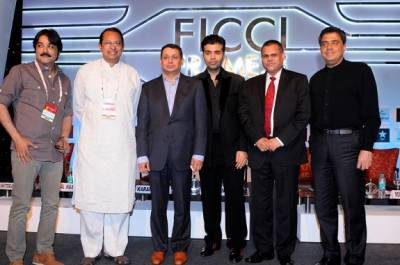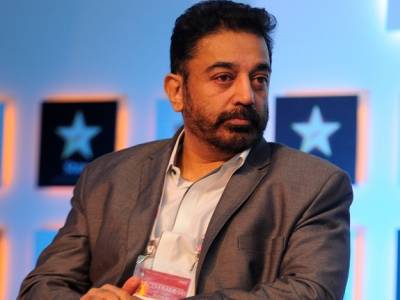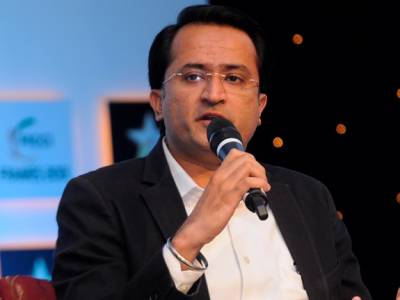FICCI FRAMES 2013: Sansani won't go far; Times today are changing
Day 3 at FICCI saw a mixed bag of discussions and also a mixed bag of reactions of sort from the audience. But when it came to about a discussion on the electronic news and the enormous challenges that news channels face in the emerging markets, audiences could not keep themselves away for too long and when you have eminent speakers like Vikram Chandra, Group CEO, NDTV Ltd., Dr Bhaskar Das, Group CEO, News Cluster, Essel Group, Deepak Chaurasia, Editor-in-Chief, Indian News, ITV News Media, Alexey Nikolov, Editor-in-Chief, Russia TV Today speaking, you could not desist but listen to them in awe. Mr Nalin Mehta Senior Visiting Research Fellow, National University of Singapore & Author was the moderator for the panel discussion on Electronic News Media-Stock Taking and the Way Forward.
The session kick started with Vikram’s observation on the current scene in the news media. “Is it the worst of the times for the news media or do we see a turn around? The root cause of this situation is the breaking news model followed. Indian News Industry is a profit centric, cost centric industry and unfortunately we are not making much money from the distribution side and are completely depended on revenue from the advertising. Fixing a price of your product is not something that helps in India. Yes but we are seeing a turn around with digitization being introduced in India. Digitization will fix the prices and it will ultimately help us to even find the best content. The ultimate thing is that if we are able to nail the root cause we will find the way forward.
Bhaskar Das opined that India was seeing a transition times and this could work if management and leadership will work hand in hand. There is a huge commoditization of news business in India and today news is just a click away with twitter being the biggest competitor of journalists. The more there is incompetence in the field; the tolerance level will go down. Thus in times like these to maintain the objectivity is going to be a huge challenge. Subjectivity today is the new objectivity, for everyone is only interested in the phenomena called Breaking News.
Deepak Chaurashi argued that twitter can never replace the place of a news channel or news paper in India. The reason being that internet penetration is limited to urban metros and moreover there is a fraction of India’s population who understand English. People in the remote regions want to know about news that affects them. There are no level playing fair rules in this industry, the competition is tough and in a tricky situation like this we suffer credibility to maintain the breaking news content. Despite these many flaws I take pride in saying that I belong to the Indian Television Industry which has matured in a short span of twenty years.
While the three above gave us a perspective of the India centric model Alexey brought in the global perspective for the audience. He said that there is a terrible business model of news globally. We are trying to reach out to the global audience but we face a huge number of challenges before us. The trade has experienced a sudden decline. News media and social media brought a threat to the market, however we realized that fighting social media was of no consequence, instead utilizing the weapon of the enemy and using it to our advantage has brought an upward trend. Three years ago the popular sentiment was social networking sites will kill us but then let’s face the fact that there is always the need for the new and despite the new factor people also want reliable information. Previously we were selling news in the information business but now we are selling trust and competence. “I want my journalists to be universal soldiers good in all the four mediums of media,” he concluded.
Vikram Chandra agreed to Alexey’s remarks about selling trust and said that it is possible to create trust in today’s market. There are enough channels today that won’t carry solid news and therefore their credibility is jeopardized and some channels would not run after TRPs and follow the model of providing concrete news to its audience and not succumb to the tabloid model of content. As brands come to realize that they won’t work on channels which do not have credibility in terms of giving out news to its audience and only create “sansani”; they would themselves look for an alternate models and this will give a boost to those who produce great content. It may seem that the market pushes you in a direction but if you have your mind set you would be able to continue with your good work and create great news content.
The panel now seemed to be appearing on the same page as Das nodded in agreement with Chandra and said, “Trust is not negotiable, for it has today become subjective. The audiences today are smart enough to differentiate between two channels and who provides the serious, trustworthy content.
Deepak Chaurasia here commented that everyone has a vested interest. However some associations are coming up to fight collectively and address the problem of corruption in news medium honestly. Vikram sided with Deepak to say that the industry today comes together to fight certain battles such as in the like of digitization. It is mammoth struggle ahead and there are many battles to be fought. The problem today is with the audience rating system and it is difficult to create a common platform where everyone comes together to address the issues that we all have in common. Das said that finding out a common solution is not easy because this is a complex issue. The double standards have to go from our behavior. “I am not an optimist that the change will come overnight”.
We agree that the change would not come overnight but we are sure that if the industry stands up together the common problem can be addressed may be not overnight but definitely in some time.











Share
Facebook
YouTube
Tweet
Twitter
LinkedIn